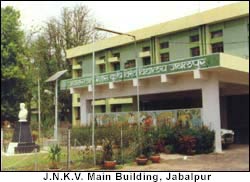![]()
JAWAHARLAL NEHRU
KRISHI VISHWAVIDYALYA
JABALPUR 482 004
 The biggest multi-campus university,
Jawaharlal Nehru Krishi VishwaVidyalaya, was inaugurated on 2 October
1964. At present, JNKKV encompasses seven colleges of Agriculture, two
of Veterinary science and animal husbandry and one of Agricultural
engineering; nine Zonal Research Stations; 16 Regional Research
Stations and 15 Krishi Vigyan Kendras in 9 agro-climatic zones spread
over 45 districts.
The biggest multi-campus university,
Jawaharlal Nehru Krishi VishwaVidyalaya, was inaugurated on 2 October
1964. At present, JNKKV encompasses seven colleges of Agriculture, two
of Veterinary science and animal husbandry and one of Agricultural
engineering; nine Zonal Research Stations; 16 Regional Research
Stations and 15 Krishi Vigyan Kendras in 9 agro-climatic zones spread
over 45 districts.
Vice-Chancellor is its Chief Executive, supported by Director of Instruction, Director of Research Services and Director of Extension Services. The Faculties of Agriculture, Veterinary Science & Animal Husbandry and agricultural Engineering are headed by respective Faculty Deans, supported by Deans of constituent colleges and Heads of Departments. Registrar and Comptroller support the Vice-Chancellor in Board of Management and the Academic Council, Administrative Council, Extension Education Council, Research Council and Council for Post-graduate Studies are the highest bodies for making necessary decisions.
The university offers Bachelors, Masters and Doctorate degree programmes in Agriculture, Veterinary sciences and animal husbandry, and Agricultural engineering.
Identified potential cropping systems for different agro-climatic zones for irrigated and unirrigated Situations;
developed packages for economic and efficient use of fertilizers, manure and bio-fertilizers;
integrated package for the management of major insect-pests, diseases and weeds;
package for cultivation of betelvine with efficient and economical management of diseases;
developed a superior pig breed Jabalpur Black for tribal and marginal farmers;
developed low-cost machineries, viz. thresher for sunflower, safflower handling devices, waternut
decorticator, pea-peeling machine, chickpea stripping-cum-shelling machine, tillage equipment, energy-
saving dryers and onion-storage structure;
developed electronic instruments such as multi-channel electronic choke indicator for tractor-driven
seed drills, digital grain-moisture meter, fertilizer recommendation package, micro-controller based
rice polish measurement system, soil nutrient-estimation system, micro controller-based sulphur estimation system and personal computer-based monitoring system for safe grain storage.
Multi-disciplinary research of applied nature is conducted in Natural resource management, Crop- improvement, Crop protection, Post-harvest technology, Farm machinery and Livestock production and management.
Seed Production
The university maintains the nucleus seed of 144 varieties of 37 crops under single window system.
The major achievements of the university are the development of 19 varieties of rice, seven of wheat, five of maize, six of sorghum, 12 of chickpea, five of pigeonpea, four of greengram and blackgram each and two of lentil;
high-yielding and oil-rich varieties of mustard (1), sesame (5), safflower (3), niger (1), groundnut (3) and soybean (9);
world-famous JS (Jawahar Soybean) series of soybean varieties with better oil (18-20%) content and resistant to major diseases, which laid strong foundation for expansion of its area and production;
coarse millet varieties of kodo (9), ragi and kutki (3 each) for tribal areas; and vegetables such as chilli (2), table pea (5) and sweet potato (2), tomato (1) and Indian bean (4).